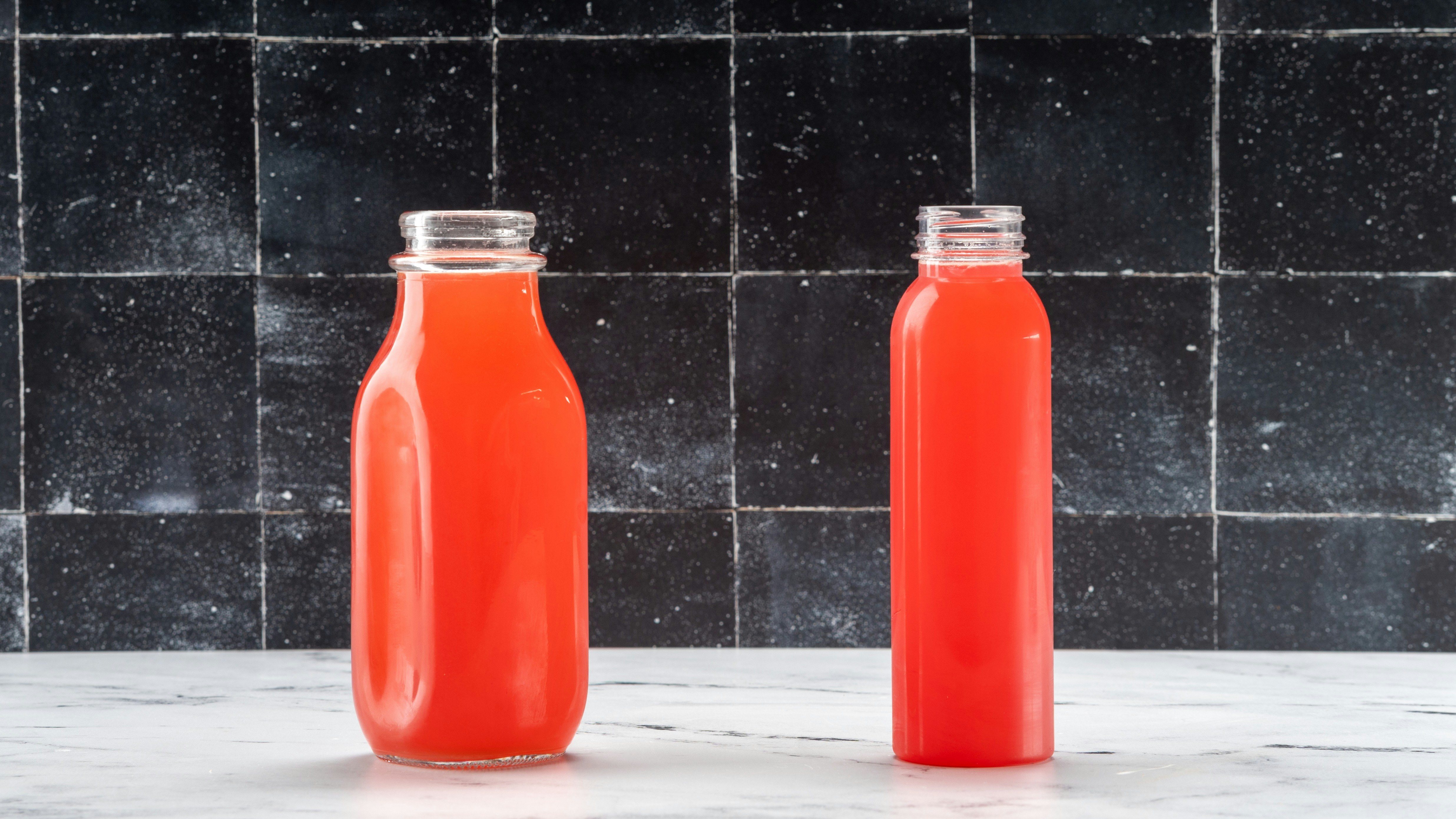Glass bottles have many benefits over plastic bottles when juicing. Sustainability, quality, safety, and keeping juice fresh are all relevant factors when it comes to choosing glass over plastic containers.
For both business owners and consumers, storing juice in single-use plastic bottles is generally easier and cheaper. Glass is heavy and breakable, and when it comes to production and shipping costs, glass is a whole lot more expensive than plastic. However, many believe the benefits of glass outweigh the negatives.
In this article, we'll explore the benefits of glass and the advantages of using glass packaging over plastic when juicing.
1. Sustainability of Glass vs. Plastic
The biggest difference comes down to reusability. Single use plastic bottles are used once and then thrown away or recycled. A premium glass bottle can be reused many, many times. Juice bars purchase high quality glass juice bottles and offer return programs so customers can return their glass bottles. This way, the same bottle gets used again for future customers. Reusing a container is much more sustainable than recycling, because recycling still takes a lot of energy and carbon to collect the bottles, transport them, sort them, and turn them into new bottles.
Even when recycling, and not reusing, glass is still more sustainable. It is ultra durable and 100% recyclable—not once but multiple times, with no limit. In fact, regardless of the number of times glass is recycled, no degradation of quality or purity occurs. Within about 30 days, glass can go from the recycle bin and back to the store shelf as new containers filled with product of any kind. By using recycled glass to create new glass bottles, manufacturers significantly reduce their carbon footprint. Most plastic aren't even truly able to be recycled, and if they are, they can typically only be recycled once or twice before landing in landfills anyway.
2. Consumer Perception
Even though the use of plastic packaging continues to rise, research consistently indicates that consumers perceive glass packaged products as high and higher quality.
Many manufacturers use aesthetically pleasing glass packaging as a marketing tool to emphasize sustainability and premium quality.
Environmentally conscious juice consumers will likely have a more positive perception of juices in recyclable and eco-friendly glass bottles.
Customers will actually pay more for a product if they perceive it as being higher quality due to the packaging.
3. Product Safety - Chemicals and Microplastics
Choosing glass containers can prevent BPA and other endocrine disruptors from leaching into the contents because they are chemical-free. Plastic contains bisphenol A (BPA), polyvinyl chloride, phthalates, and other toxins.
BPA-free plastics are not necessarily safe because BPA-free only means that other chemicals were used to replace BPA, which could still pose health risks. No plastic compares to glass in terms of leeching and porosity, there is simply no debate here.
In addition to chemicals, single use plastic bottles can actually leave tiny pieces of plastic in the beverage. It's recently been shown by the National Institute of Health that, on average, a liter of bottled water included about 240,000 tiny pieces of plastic. About 90% of these plastic fragments were nanoplastics. Yumm, this juice tastes like plastic!
4. Freshness and Shelf Life
Glass is actually insulating, meaning it will keep the juice cold longer after removing from the fridge. Keeping juice cold keeps it fresh longer, leading to better color, flavor, and taste.
Additionally, glass is an inert material, which means it does not react chemically or biologically with the contents of the bottle. This ensures the preservation of the freshness, taste, and nutritional content of the juice.
Furthermore, glass is non-porous, meaning that it does not absorb flavors or odors from the contents. Therefore, juices in glass bottles won't pick up and retain the flavors or aromas of previous contents or the packaging material.
One more advantage of using glass over plastic is that glass can resist temperature changes. In contrast, the taste and nutritional value of temperature-sensitive juices can be affected negatively if stored in plastic packaging. You may have noticed that if you drink something that's been in a plastic bottle for a long time, it can actually taste like plastic. This will never happen with glass.
Conclusion
In a world where the convergence of health, sustainability, and quality is evident, glass juice bottles emerge as the undisputed champion. Not only does glass preserve freshness, it also prioritizes your well-being, and has a positive impact on the environment.
The secret to the success of glass juice bottles lies in the skillful craftsmanship of glass juice bottle manufacturers. It's critical that the emphasis is placed on quality and sustainability, ensuring that each bottle meets the highest standards for both personal and corporate usage.


Comment